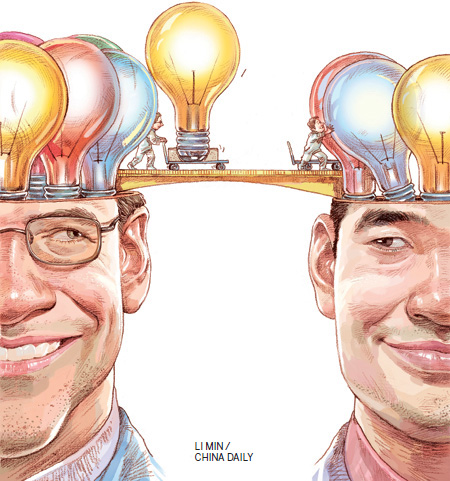Research in motion
Updated: 2011-11-11 09:02
By Andrew Moody (China Daily)
|
|||||||||

Multinationals moving R&D centers to China
Chuang Ching may be a head of research and development for a company that invented the telephone but it is China where he now wants to be.
|
||||
The company is one of an increasing number of foreign multinationals that have a major research and development hub in China.
According to China's Ministry of Commerce figures, there are now 1,200 foreign multinational R&D centers in China, representing a $12.8 billion (9.3 billion euros) investment. There are no fewer than 353 such centers in Shanghai alone.
Chuang, executive vice-president of product and research and development of Alcatel-Lucent Shanghai Bell, says China was at the forefront of the company's research and development efforts.
"China has a rich talent pool and our workforce is very young, dynamic, highly motivated and able to meet challenging targets," he says.
Foreign multinationals increasingly see China as the land of invention.
The once technologically backward country - that shunned science for 200 years until the last century - is now a magnet as one of the world's major R&D centers.
Since 2002 expenditure by foreign companies in research in China has increased by 21.2 percent annually.
According to a forecast by Battelle magazine, China is set to overtake Japan as the second-largest spender on R&D this year with total expenditure of $153.7 billion compared to its neighbor's $144.1 billion. It still trails well behind the United States, which spends $405.3 billion.
The attractions of the world's second-largest economy as an R&D center may be obvious. There is a plentiful supply of young and relatively inexpensive science graduates compared to the West.
China has one of the fastest growing and potentially biggest markets in the world so to be able to develop a product or service for that market could deliver major financial benefits.
The government is also keen to offer incentives for foreign companies to set up R&D bases in the country as part of its 12th Five-Year Plan (2011-2015).
Chuang, who is from Taiwan and educated in the United States at the University of Southern California, says government support is attractive to multinationals.
"The government's Five-Year Plan is focused on innovation and a very important part of that is incentives to encourage research and development investment not just for domestic but for multinational companies too, relating to costs and business tax incentives to set up research and development centers."
While there are many upsides to having a research and development base in China, for some companies there is one big risk - intellectual property theft. Many companies are nervous about bringing their core blue-sky research to China. That, they feel, is best kept under lock and key at their corporate headquarters in the West.
Many cite the problem as enforcement rather than Chinese law. Even the very simple process of applying for a patent in China can expose any innovation to the risk of being copied.
"You can put a patent out and it is copied straight away," says a leading business adviser in China who didn't want to be named.
"I have even seen cases of Chinese companies seeing what a competitor has developed and then patenting it themselves, enabling them to sue the competitor who invented the particular thing in the first place for patent infringement. There have been a number of Chinese companies fighting each other like that."
Franz Greidanus, head of Dutch electronic and consumer goods conglomerate Philips Research Asia, based in Shanghai, is a seasoned veteran of the China R&D scene having been in the country for six years.
He says there could be big IP risks for some companies doing business in China.















